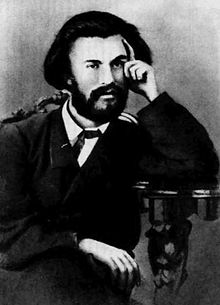Mykhailo Drahomanov
Mykhailo Petrovych Drahomanov Михайло Петрович Драгоманов | |
|---|---|
 Mykhailo Drahomanov | |
| Born | September 30, 1841 Hadiach, Poltava Governorate, Russian Empire |
| Died | July 2, 1895 (aged 53) Sofia, Bulgaria |
| Occupation | Economist and historian |
| Nationality | Ukrainian |

Mykhailo Petrovych Drahomanov (Ukrainian: Михайло Петрович Драгоманов; September 30, 1841 in Hadiach – July 2, 1895 in Sofia) was a Ukrainian political theorist, economist, historian, philosopher, ethnographer and public figure in Kiev.
Biography
Born to a noble family of Petro Yakymovych Drahomanov who was of a Cossack descent, Mykhailo Drahomanov started his education at home, then studied at the Hadiach school, Poltava senior school and Kiev University. He was also an uncle of Ukrainian poet Larysa Kosach (Lesya Ukrainka) and brother - Olha Drahomanova-Kosach (Olena Pchilka). Drahomanov's uncle, Yakiv Drahomanov, was a member of the Decembrist movement and political prisoner for participating in the secret Society of United Slavs.[1]
During the transferring of Taras Shevchenko remains from Saint Petersburg to the Taras Hill, Drahomanov gave a speech over his tobm when it stopped in Kiev.
Drahomanov lectured at Kiev University from 1870 to 1875, but because of the repressions against the Ukrainian movement peaking up in 1876 with Ems Ukaz was forced to leave the Russian Empire and emigrated to Geneva. In emigration he continued his political, scholarly and publishing activities. In 1885–95, he was a professor at the University of Sofia to his son-in-law Ivan Shishmanov. Drahomanov wrote the first systematic political program for the Ukrainian national movement. He himself defined his political convictions as "ethical socialism," and was deeply impressed by socialist literature as a teenager.
Hromada and Socialism
Drahomanov was one of leaders of Kiev hromada (later known as the Old Hromada), while continuing to pursue his academic career.[2] Being a member of the Russian Geographic society, he established contacts with Ukrainians of Austria (in Galicia).[2] Under his influence, the Academic Circle in Lemberg (Lviv) adopted the Ukrainian democratic platform.[2] As a victim of anti-Ukrainian repressive measures by the Russian government, in 1875 Drahomanov was fired from the Kiev University.[2]
In 1876 Drahomanov became a spokesman of Hromada abroad (Western Europe) while settling in Geneva, Switzerland.[2] Between 1878-1882 he published a Ukrainian political magazine Hromada and number of Russophone pamphlets.[2] Drahomanov also created a Ukrainian socialist organization the Geneva Circle.[2] In 1886 his political stance became not aligned with the political views of Hromada, which resulted in a rift between then, and the society in Ukraine losing its financial support.[2]
Legacy
The lasting legacy of Drahomanov can be discerned in the whole Ukrainian tradition of leftist political parties and political activism. He personally influenced a handful of younger Ukrainian intellectuals in Habsburg Galicia in the late 1870s, first of all Ivan Franko and Mykhailo Pavlyk, both of whom accepted his ideas although reworked them later according to their own mould. In 1890 these intellectuals founded the first Ukrainian political party - Ruthenian-Ukrainian Radical Party. The program-maximum of this party was socialist and therefore the party can be seen as one of the first socialist parties in Eastern Europe.
Drahomanov tried to popularize an orthographic reform, called the Drahomanivka after him.
In 1991, the "Kievan State Pedagogical University Named After Mykhaylo Drahomanov" in Kiev was founded on the basis of the former "Kievan State Pedagogical University Named After Maxim Gorky". In 1997, the university was granted "National University"-status.[3]
Literature
- Hornowa E. Problemy polskie w twórczości Michala Drahomanowa. – Wroclaw, 1978.
- Rudnytsky Ivan L. Essays in Modern Ukrainian History / Ed. by P.L. Rudnytsky. – Edmonton: Canadian institute of Ukrainian studies, University of Alberta, 1987. – 499 p. Drahomanov as a Political Theorist – P. 203 – 253. The First Ukrainian Political Program: Mykhailo Drahomanovʼs “Introduction” to Hromada. – P. 255 – 281. Mykhailo Drahomanov and the Problem of Ukrainian-Jewish Relations. – P. 283 – 297.
References
- ^ Yakiv Drahomanov at the Encyclopedia of Ukraine
- ^ a b c d e f g h Mykhailo Drahomanov at the Encyclopedia of Ukraine
- ^ "Історична довідка". Npu.edu.ua. Retrieved 2013-05-11.
External links
- Biography of Drahomanov at the Encyclopedia of Ukraine
- “Mykhaylo Drahomanov: A Symposium and Selected Writings”, ed. Ivan L. Rudnytsky, The Annals of the Ukrainian Academy of Arts and Sciences in the U.S., Vol. II, Spring, 1952.
- Bibliography of Writings by and on Mykhaylo Drahomanov—nearly comprehensive
- Biography of Drahomanov and his writings (in Ukrainian)
- The Orthodox Nationalist: Mykhailo Drahomanov audio
- 1841 births
- 1895 deaths
- People from Hadiach
- People from Poltava Governorate
- Ukrainian scientists
- Ukrainian philosophers
- White Russian emigrants to Bulgaria
- Ukrainian emigrants to Bulgaria
- Taras Shevchenko National University of Kyiv alumni
- Taras Shevchenko National University of Kyiv faculty
- Sofia University faculty
- Burials at Central Sofia Cemetery
- Ukrainian ethnographers
- Ukrainian nobility
- Ukrainian ethnologists
- Hromada (society) members
- Ukrainian victims of human rights abuses
- Ukrainian socialists
- Ukrainian nationalists
- Imperial Russian emigrants to Bulgaria
